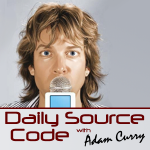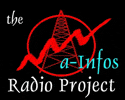With the word “podcasting” firmly entrenched in the English language it’s a bit hard to believe that the medium is only five years old. Wired’s This Day in Tech marked yesterday, Aug. 13 as the fifth anniversary of the start of Adam Curry’s Daily Source Code, the first widely popular podcast. 
And what was that idea in the first place? The notion of having a regular radio program online was not remotely new by 2004. It was no problem listening to popular public radio programs like This American Life online. Even my little old radioshow was posted for download before Curry and Winer coined the term “podcast.”
The key innovation of podcasting was to make it easy to subscribe to a feed so that the programs would be downloaded to your computer automatically. No more checking a site over and over to see if a new show was posted. Simple, but effective.
The interesting thing about podcasting is that this little bit of tech has become so ingrained in our culture already that “podcast” has become pretty much synonymous with “online radio program.” When podcasting became a hot trend in educational media, ’round about 2005 and 2006, I presented several workshops on the topic. My first order of business was always to point out the simplicity of the concept and also clarify the fact that a podcast, by definition, refers to a series of audio programs that one can subscribe to, not just an audio program posted online.
The reason I felt the need to clarify so strongly is that as an educational media producer I started having many clients come asking for us to podcast a lecture. I would always ask if they were planning to have a series of lectures or other programs. And more than half the time, the answer was “no, we’re just having this one.” My response would be, “so what you really want is to record this lecture and make it available on a webpage?” And the typical answer would be, “Yes, that’s right, we want a podcast.”
Ugh.
Of course, it was no problem to record the lecture and post the MP3 online (nevermind the clients who didn’t want their “podcast” to be downloaded–just streamed). But there was no reason anyone would subscribe to this “podcast” since there would never be episode #2. It was also a little frustrating because clients would act as if it had never been possible to post audio programs online before, despite the fact that my department had been offering it as a service for at least five years by that point.
Eventually I gave up on explaining the difference because it became obvious that nobody cared, and the difference didn’t really cause any problems.

So, Happy Birthday to the podcast, and may a million more be born and syndicated.
Leave a Reply